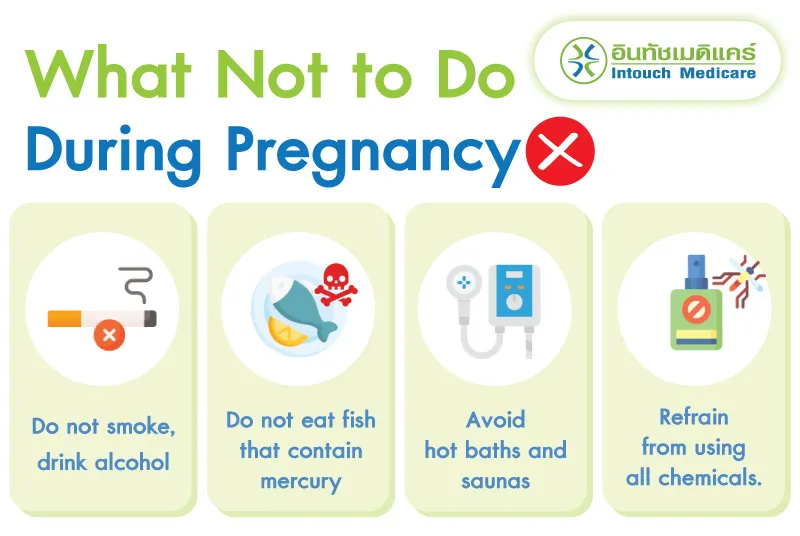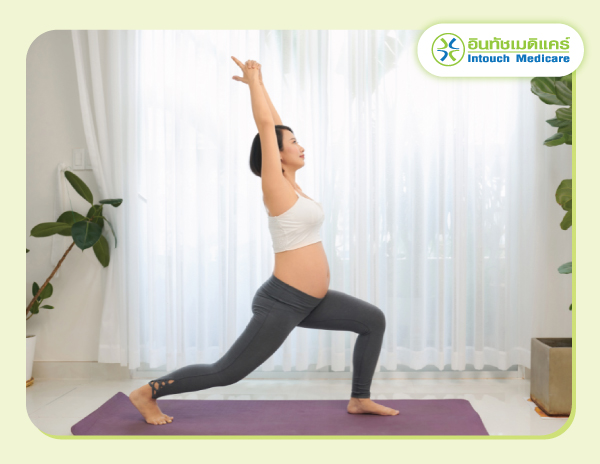Taking care of yourself during early pregnancy is not difficult. Once you know you are pregnant, besides starting prenatal care, it’s important for expectant mothers to know what they should and shouldn’t do. ![]()
|
|
In this article, Intouch Medicare provides tips on how to take care of yourself during pregnancy, especially for first-time mothers.
How to Take Care of Yourself in Early Pregnancy

-
Start prenatal care immediately upon learning you are pregnant.
-
Consult your prenatal doctor before stopping any medication or starting a new one.
-
Take prenatal vitamins with 0.4-0.8 mg of folic acid daily, as recommended by your prenatal doctor.
-
After 28 weeks of pregnancy, monitor the baby’s movements daily. You will notice that the baby moves more at night. If you notice a

-
Eat a variety of healthy foods and drink plenty of water during pregnancy.
-
Exercise appropriately and maintain a healthy weight during pregnancy.
-
Get enough sleep to ensure both the mother and baby have good physical and mental health before and after delivery.
-
Attend all prenatal appointments to monitor the baby’s development. The doctor will perform an ultrasound to determine the baby’s gender, which can be an exciting moment in life.

What Not to Do During Pregnancy
-
Do not smoke, drink alcohol, or use any drugs. Avoid being near people who smoke. If the father smokes, he should smoke far away or ideally quit altogether for the well-being of both the mother and baby, both during pregnancy and after birth.
-
Do not eat fish that contain mercury.
-
Avoid hot baths and saunas.
-
Refrain from using all chemicals.

Medication use during pregnancy requires great caution, as the fetus is developing various organs in terms of structure and function.

Recommendations for Medication Use in Pregnant Women
During pregnancy, take medications only when necessary. Some symptoms, such as morning sickness, nausea, vomiting, body aches, and insomnia, may not require medication. If medication is needed, use the smallest possible amount.
Do not self-medicate. ![]() If unsure whether a medication may affect the fetus, inform your doctor or pharmacist when purchasing medication or receiving medical services, and consult your prenatal doctor.
If unsure whether a medication may affect the fetus, inform your doctor or pharmacist when purchasing medication or receiving medical services, and consult your prenatal doctor.
Prenatal Care at Intouch Medicare: For more information, please inquire.
How to Take Care of Yourself During Pregnancy
Follow Your Doctor’s Advice
The first step in taking care of yourself during pregnancy is to listen to your specialist’s advice and prenatal care provider. Choose someone you trust with your health and your baby’s health. Follow the advice seriously and adhere to the guidelines given by the medical team regarding exercise, nutrition, and health.

Attend all prenatal check-ups regularly and speak with your prenatal clinic doctor if you have any questions or concerns about your pregnancy.
|
|
Articles you should read : Frequently Asked Questions about Prenatal Care
Choose Healthy Eating
Eating a nutritious diet is very beneficial because essential nutrients support your baby’s growth and development. You will feel better when you consume enough vegetables, fruits, lean proteins, healthy fats, and whole grains.
Make sure you follow the dietary recommendations provided by your doctor, especially if you are at risk of complications such as preeclampsia or gestational diabetes.

Pay Attention to Exercise
Exercise is a crucial part of self-care during pregnancy and should be part of your routine, whether you are pregnant or not.
![]()
Pregnant women should engage in moderate-intensity
aerobic exercise for at least 150 minutes per week.
![]()
Exercise can help you feel refreshed and improve your sleep. Always consult your doctor first and ensure the exercise is safe. The doctor can assess your physical condition, especially if you were not very active before pregnancy. Do not overexert yourself; start slowly and allow your body to adapt.
Rest
Rest is an essential part of self-care during pregnancy. Many pregnant women experience fatigue during pregnancy, which can make you feel run down.
|
|
Exercise can help you sleep better, but avoid exercising too close to bedtime. Practice good sleep hygiene and make sure you go to bed early enough to get 7-9 hours of sleep before waking up.

Check on the Father’s Feelings
Don’t forget to check on the father’s feelings regularly. You may be the one pregnant, but the father also has feelings, thoughts, and concerns about the new baby.
You and your partner can support each other, which will help with the adjustment and improve postnatal care success.
Start Preparing for the Baby
Both parents should start preparing the space for the baby, including baby supplies and necessary equipment to make caring for the baby easier.
|
|

Keep a Journal of Your Feelings
Many women find it helpful to write down their feelings in a personal journal to manage stress and emotions. It also makes a great keepsake.
You can look back and read about how you felt during this exciting time in your life.![]()
Journaling can help you track symptoms such as morning sickness or fatigue, and any changes, so you can discuss your concerns with your doctor.
Interesting Articles
For more info and make appointment
![]() Hot Line 081-562-7722
Hot Line 081-562-7722

Intouchmedicareclinic
Medical Clinic
![]() Latest edit : 03/07/2024
Latest edit : 03/07/2024
![]() Images may be used without prior permission exclusively for educational or informational purposes, as long as proper credit is given to intouchmedicare.com
Images may be used without prior permission exclusively for educational or informational purposes, as long as proper credit is given to intouchmedicare.com


 MM
MM

